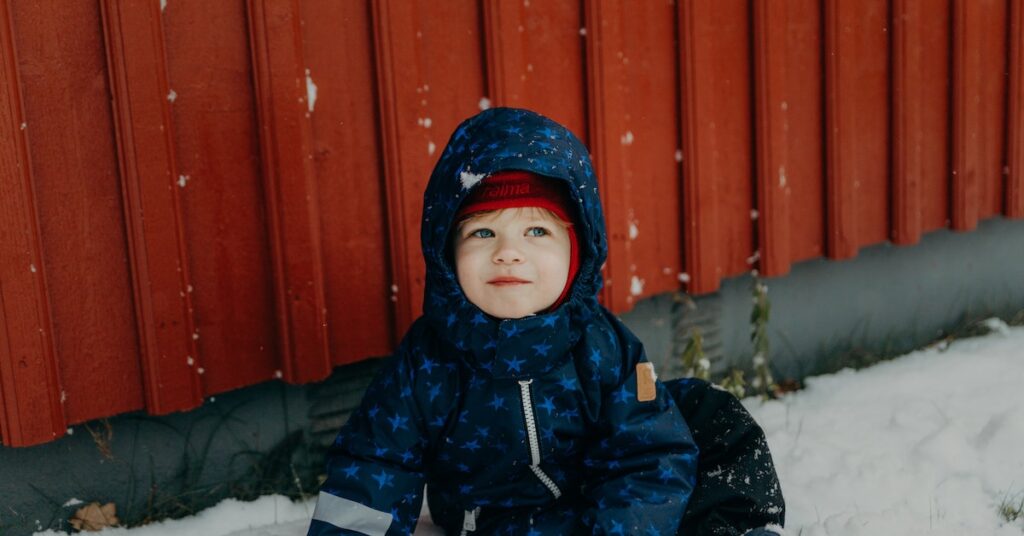How Should a Baby Be Cared For in the Winter?

Parents can wonder: How cold is also cold for an infant when the high temperatures are enough to have even the most energetic with us shivering to the cartilage. Even a young child, for that matter!
Everyone has a somewhat varied tolerance for the cold (there’s always that one guy who plows his driveway in shorts!). However, there comes a point where the cold isn’t simply unpleasant; it’s also quite harmful for young children. Therefore, despite how much you want to play in the snow outside.
Since infants are unable to communicate their discomfort with us, it is up to us as parents to be aware of the ideal temperature ranges for baby sleep in order to keep our children both secure and comfortable. Infants seldom need to be kept extra warm and covered up at all times, despite what many parents think. In fact, an infant who is overly hot is more likely to have SIDS (Sudden Infant Death Syndrome). This risk is present from birth until roughly six months of age, although it is most obvious during that time.
Why is it Vital to Look After a Baby During the Winter?
Until they are able to properly support themselves on their own, newborn newborns need constant care and attention. However, they require particular attention throughout the winter since a drop in temperature sets off a number of physiological processes that help the body protect itself and its important organs functioning well.
The majority of the energy is therefore diverted from other uses in order to keep the body temperature adequately. This is again the point at which the body’s immunity is weakened. The bacteria and viruses flourish in the winter and look for hosts to infect. Babies’ vulnerability to sickness and likelihood of becoming sick rise when their immune systems are compromised.
Virus-Related Issues in the Winter:
The flu season falls throughout the winter. This time of year is when the virus is most contagious and quickly spreads to everyone. This results in the common winter illnesses like:
- Croup and the rhinovirus, as well as influenza and bronchiolitis
- Various respiratory viruses that damage the respiratory system and cause coughing and serious breathing issues
Infant Winter Infection Symptoms:
Winter infections tend to have more pronounced symptoms, which makes them simpler to identify. You’ll recognise the following signs of an illness in your infant:
Your kid can have problems breathing; he might gasp or take shallow breaths. He might cough violently and possibly throw up.
He may have chest pain from inflamed lungs caused by a respiratory infection. He concedes to the possibility of further wheezing while asleep or even afterwards hacking. He granted permission likewise to have a watered-down nose, a fever, a cough, and a headache.
What Dangers do Newborns in Really Cold Weather Face?
Babies are more likely to experience hypothermia than adults because of their smaller stature and lower muscular mass. Hypothermia symptoms include shaking, sluggish breathing, and pale, chilly skin. Babies who are overheated often appear uneasy. A baby that overheats will have red skin and a flushed appearance, similar to adults who overheat.
If at all feasible, think about clothing your child in natural fibers like cotton or bamboo. With their aid, your baby’s skin will be able to breathe and stay cool. If it’s cold outside, cover your baby’s feet with socks. Dress them in garments with a tighter weave when it’s much colder outside. This will assist in maintaining your baby warm.
My Infant Is Excessively Hot or Excessively Cold:
Consider how you are dressed when deciding how to outfit your kid during chilly weather. The standard recommendation is to search out wear the same number of tiers as you are tiring plus individual extra for your youth. Try to outfit your infant in airy, simple-to-remove layers in case they warm up. If they are clad or covered in several layers of clothing, it doesn’t take much for them to become overheated.
Even though your baby’s hands and face may appear cold, their core body hotness can vary. Feel their back and stomach skin to receive a better estimate of their physique hotness. Warmth concedes the possibility of being sensed on their skin, conservative cold or heat.
You can tell how comfortable your infant is by observing their behavior. If your baby is content, they will be content if they are happy, active, well-fed, and resting.
Winter Infant Care:
If you’re a new mother, you’ll want to protect your infant from the piercing cold waves outdoors. During the cold, all you are going to do is stay warm and comfortable inside your home. Since a newborn’s immune system is still growing, moms worry that the infant may be more susceptible to colds and infections as the weather begins to get colder. Additionally, your baby may be more vulnerable to different illnesses throughout the winter. Here is some winter parenting advice to keep your child safe this season as babies can’t shiver to boost their body temperature.
Bathing:
Maintaining hygiene requires regular cleaning and bathing. Ludicrously wash your child every other day in the cold. On other days, just clean their body with a moist towel before changing into new clothing. This will lessen the chance of becoming sick and aid in keeping the skin moist.
Moisturization:
During the cold, the dry, cold air saps all the liquid from a baby’s skin, leaving it dry and eccentric. At least twice a day, massage your baby’s skin to keep it moisturized in winter.
By being absorbed, oil keeps the body’s interior tissues moist. Furthermore, oiling enhances a baby’s bones. Warm mustard or coconut oil can be used to massage your newborn throughout the winter. Choose skin creams or moisturizers that are particularly made for newborn skin. You can keep your baby’s skin smooth and shiny by using a cream or lotion containing milk cream and butter.
Give your Infant a Good Massage:
Warm oil massages for your infant will keep them cozy and warm throughout the day. Blood circulation may be improved with massage oil, which also promotes a baby’s healthy growth and development. It can help with digestion, improve sleep, develop bones and muscles, and provide the baby’s skin the nutrients and moisture it needs in addition to keeping the newborn warm.
Operate a Humidifier:
It enhances the ability to use a humidifier in your baby’s range if you occupy it in a refrigerator humidity. It is advised that you utilize portable heaters or heating systems in your baby’s room during the winter because the temperature will drop drastically. If you use a heating device, it might deplete the air in the space of water vapor, drying the air and your child’s skin. Install a humidifier in the space as a result to keep the moisture levels at their ideal levels.
Layer Your Baby’s Clothing:
Wearing layers can keep your baby warm whenever they are not in a car seat and will be outside. Layering your baby’s clothing enables you to adapt to their demands. Leggings and a bodysuit might be snug-fitting options for the base layer. You can add a second pair of jeans and a long sleeved top in addition to that. Finally, increase a covering, headpiece, pair of dense booties, and mittens to hold your hands and extremities warm. To be able to pretend and mock robes as wanted, select breathable matters like cotton and muslin.
Go in the Sunlight:
The best source of vitamin D, which is necessary for building stronger bones and enhancing the immune system, is sunlight. Spend a little time in the sunlight accompanying your baby after soaping or changing her attire. It is also thought that sunshine warms a baby’s body and kills infections.
Avoid Using too Many Products:
Since you are a new parent, you’ll want to purchase every innovative and promising infant care item that’s on the market, but avoid the urge as applying too many products on your kid’s skin won’t be beneficial for him. While using lotions and creams is OK, often bathing him and using a variety of products will only cause his skin to become dry. Avoid using soaps and shampoos often or on a regular basis. His skin will lose moisture from these creams, becoming dry.
Verify the Room’s Temperature for Your Baby:
Your kid will remain secure and shielded from the chilly winter winds if your home and the room where your child is sleeping are warm and cozy. Shut the windows in your house and secure the doors. In light of this, be careful to keep the air flowing in your baby’s room and living space. If necessary, use a heater to make sure your kid is cozy all by himself.
The Best is to Breastfeed:
Mother’s milk is a good source of iron and can support a baby’s development of strong bones and muscles. The finest thing a mother can do to protect her infant from infections and diseases is to touch and warm her. All the nutrients a newborn needs to be healthy are provided by mother’s milk.
Maintain Your Health and Safety:
Your health is just as crucial to taking care of your infant as is his or hers. Since you will always be the mother’s initial point of contact with your child, keeping your home tidy and healthy is crucial. The immune systems of newborn newborns are not developed enough to withstand the infections brought on by changing weather.
Don’t Use a Thick Blanket:
Wintertime blanket wrapping for your newborn may sound reasonable, but trust us, it is not. While a thick blanket will keep them warm, it may also make them uncomfortable and make it difficult for them to move their arms and legs. It is usually advised to keep the room at a optimal temperature and use a light blanket.
Vaccination:
The greatest approach to safeguard your infant throughout the winter, when infections are more prevalent, is to get them vaccinated. Make sure you rigorously adhere to their vaccination regimens, without skipping or missing any of them. Additionally, if you are unwell, try to avoid the infant. Due to their very compromised immune system, even minor negligence can be dangerous.
Wear Your Infant to Stay Warm:
In chilly weather, carriers are a terrific method to use your body heat to keep the baby warmer—but then they probably won’t need that extra sweater. However, since they lose heat through their feet and head, they should constantly keep them covered.
Always keep your baby’s airway open when wearing them by making sure their face is not forced against your chest or other body parts, especially if you’re wearing a cold jacket. Also, watch out for ice so you don’t slip and fall.
Outdoors, Be Cautious:
It is OK to sometimes leave the house to get some fresh air, unless it is frightfully cold outside. However, if you take your kid outside, make sure he is well covered in protection. Any physical contact with the chilly breeze may rapidly make him uneasy. Make sure that your baby’s stomach is warm and that the toes are a little on the chilly side. This is the best sign that your baby’s body temperature is normal.
Room Temperature Ideal for Infants:
Fortunately, there is a range, so you are not required to maintain a specific temperature in your house. It is recommended that babies sleep in environments that are between 65 and 70 degrees Fahrenheit (18 to 21 degrees Celsius).
If the room where your infant sleeps does not have a thermostat, use a portable indoor thermometer to keep an eye on the temperature. Babies and young children often feel comfortable at the same temperatures as adults do. Nevertheless, depending on if they tend to run hot, they could require an additional layer.
Add Soup to Your Infant’s Diet:
Winter might be a fantastic time to start including soups in your baby’s diet if he has reached the age at which he can begin eating semi-solids. In the winter, a warm bowl of soup will keep him cozy. Making soup for your infant is possible. You may add mashed (or pureed) chicken pieces or veggies to the broth. Additionally, add crushed garlic to the soup to keep your kid warm and guard him against numerous winter illnesses.
Comfortably attire your infant:
If your child is continuously wearing heavy sweaters, gloves, socks, and a hat, he may find it difficult to move about and become agitated. So make sure he is dressed appropriately for the environment and choose loose-fitting clothing that completely covers his body. You may also have him wear socks and gloves, which will keep him warm and help him sleep through the night without interruption.
Will the Winter Bring My Infant More Rest?
Although it may be simpler to look after babies when the temperature is chilly, babies do not generally sleep more in the winter. Like adults, newborns like feeling cozy and warm. A baby feels safer when you swaddle them.
The temperature of the room where your baby will sleep does not need to be measured, nor should the heating (or cooling) be left on all night. Make sure your infant is dressed in appropriate room-temperature clothing and bedding.
Can You Bring Your Child Outside in the Cold Without Risk?
Yes, in a nutshell: Babies can be outside throughout the winter. However, given that infants are still developing their ability to control their body temperature, outings should be kept short.
Young children, babies, and toddlers everyone has smaller bodies with lower body fat levels. Keep away from lows of -15 degrees Fahrenheit. Monitor the wind chill and speed often. Check the wind chill and wind speed often.
On the other hand, you should also often check on your child to make sure they are not overheated because this can lead to a rash, discomfort, and — in certain situations — a higher chance of SIDS. The best situation is to keep your child cozy but cool. Adhere to safe sleeping recommendations and avoid wearing heavy garments or blankets.
What Can You Do to Keep Your Infant Safe Outside in the Winter?
Dressing your child adequately is the greatest method to protect them from the elements. They will be more secure and warm if they are coated and dressed suitably. However, there are other significant rules to abide by throughout the winter.
Infant Carrier:
Wintertime warmth for your baby might be achieved by carrying him or her. After all, you can carry your child inside your coat if it is large enough. This allows you to remain aware of their warmth and comfort.
If you’re carrying your baby in the winter, you need to pay special attention to the weather. In the case of a fall, icy surfaces, sidewalks, and roads can be dangerous to your health and the health of your kid.
You should also avoid shielding your child’s face with scarves, jackets, or other coverings that restrict their ability to breathe freely.
Automobile Safety:
It’s critical to always abide by car seat safety regulations, but winter is a crucial time to do so. Why? Because, as was said before, fluffy or puffy clothing can (and will) flatten out during a crash, potentially throwing the infant from their seat and the automobile.
- Avoid wearing bulky clothing.
- Check that straps are properly positioned and adjusted for maximum car seat safety.
- When not in use, keep the child’s car seat inside. This will give you plenty of time to secure their seat belts properly without causing them to lose body heat.
Overall Length and Distance
Plan properly because infants and small children shouldn’t stay outside for longer than 15 minutes at a time. Take pauses, and if you’re out and about, make sure to find cover at least once per hour.
Takeaway:
In conclusion,
- Ensure to have your kids vaccinated at the proper age.
- To keep the room’s temperature between 24 and 26 degrees.
- Select breathable materials to dress babies in the winter.
Even while taking care of your newborn in the winter presents unique obstacles, the fact is that even the youngest members of your family may enjoy this season with a little planning, some consideration, and a lot of layers.





